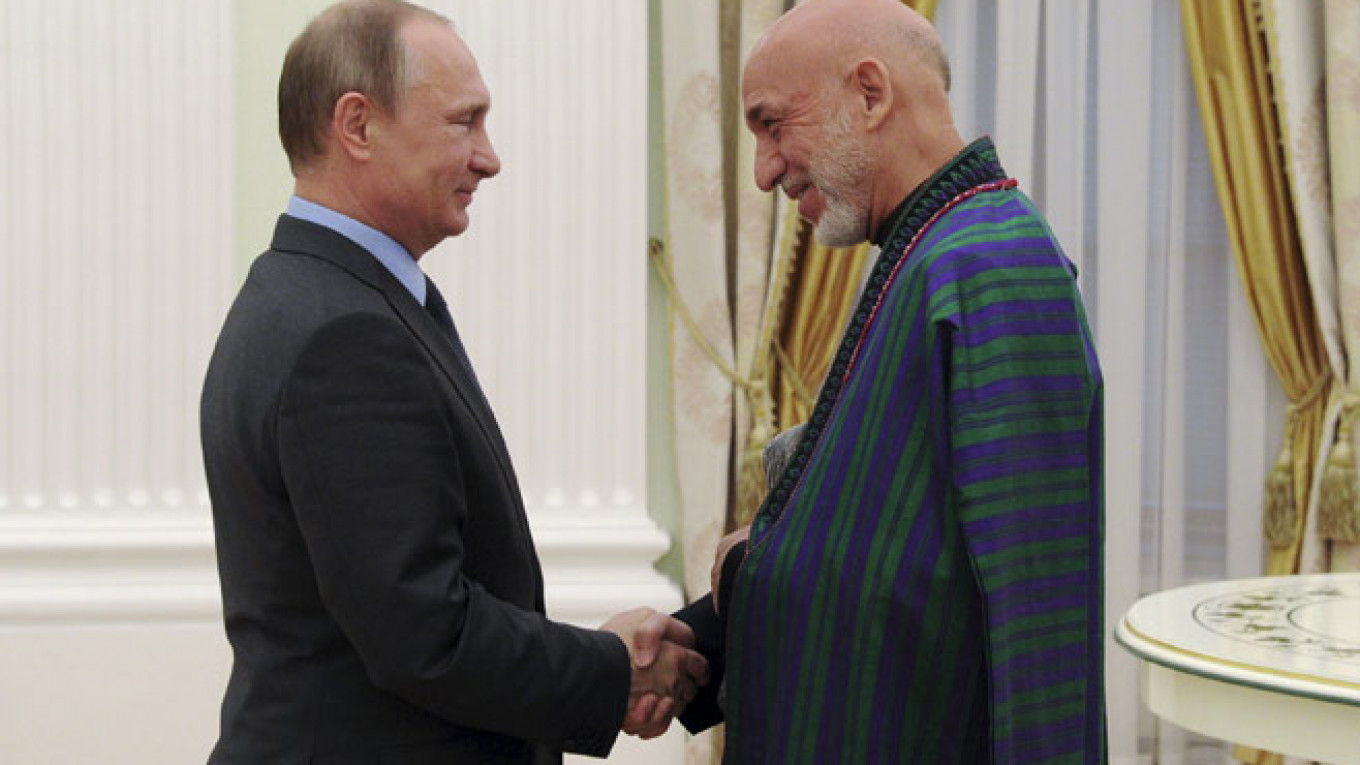Former Afghan President Hamid Karzai praised "blossoming" relations between Kabul and Moscow on Thursday during a visit to the Russian capital as the standoff between Russia and the West over the Ukraine crisis continues and the Kremlin increasingly looks toward Asia.
Karzai, who remains politically active despite stepping down as Afghan president last year after almost a decade in office, met with Russian President Vladimir Putin on Wednesday.
"We have entered a new sort of relationship with Russia," Karzai told reporters the day after the meeting in the Kremlin. "And that relationship is now blossoming."
Russia is building links with Kabul as the withdrawal of Western troops raises regional security concerns amid reports of militants proclaiming their loyalty to feared terrorist organization the Islamic State, based out of Iraq and Syria, and fears of a power vacuum in war-torn Afghanistan, which has witnessed a recent spike in violence.
'Direct Influence'
Afghanistan is looking to strengthen regional ties at a time when Western interest in the country is fading, taking with it the funds the government needs to pay the army and keep the country running.
Karzai said Wednesday that Kabul was making similar overtures to both China and Russia.
The veteran politician also emphasized Russia's long history of military, economic and cultural support for the Afghanistan going back to the 19th century, and downplayed any lasting hostility from the Soviet Union's 1979 invasion of Afghanistan, and its ensuing decade-long military presence.
"Russia is a neighbor of Afghanistan," Karzai said. "What happens in Afghanistan has a direct influence on Russia."
Islamic State Threat
There have been reports in recent months of groups in Afghanistan proclaiming their allegiance to the Islamic State, and Karzai was asked directly about this by Putin.
"We are seeing processes that are making us uneasy," Putin said, according to a transcript posted on the Kremlin website. "The so-called Islamic State is more and more active in Afghanistan and is feeling more confident. I think that in 25 out of 34 provinces we see the presence of the Islamic State."
Karzai confirmed that the Islamic State was trying to gain a foothold in Afghanistan, and warned that the militants were using his country as a "trampoline" for expanding into Central Asia.
Officials from post-Soviet states in Central Asia have warned repeatedly that the rise of instability in Afghanistan could fuel the growth of militant movements.
U.S. Withdrawal
"Russia is concerned above all about security," said Omar Nessar, the head of the Center for Study of Modern Afghanistan in Moscow.
"In Russian politics, Afghanistan is perceived as a source of threats," he added.
In recent years, Russia's relationship with Kabul was largely mediated through the United States and the other Western countries providing financial and political support to Kabul and deeply involved in the military struggle against the local Taliban movement.
The Western military presence in Afghanistan was a rare example of collaboration between the U.S. and Russia, with Moscow permitting North Atlantic Treaty Organization (NATO) military cargoes to be shipped through the country and providing a base in southern city of Ulyanovsk as a transit hub.
But Russia canceled these agreements earlier this year amid strained ties with the West over Ukraine. Washington and its allies are also winding down their deployments in Afghanistan and President Barack Obama has pledged to remove all U.S. troops by the time he leaves office in 2017.
"Russia has been forced to move away from that format [of contact via Western officials] and towards a format of direct contact with the Afghan government," said Nessar.
Deepening Ties
Karzai thanked Russia on Thursday for its support of Afghanistan's bid to gain observer status at the Asian security bloc, the Shanghai Cooperation Organization, and said that Afghanistan would seek to become a full member. Russia's is due to host the body's upcoming July summit in the city of Ufa.
The former imperial master of Central Asia, Russia has been watching with concern as China pours billions of dollars of investment into the region and is keen to shore up its influence.
Karzai, who had an increasingly acrimonious relationship with the U.S. during his final years in office, reiterated Thursday his support for Moscow's 2014 annexation of Crimea — a position that raised eyebrows in Western capitals when first announced last year.
Denouncing the "interventionism" of Western countries, Karzai said that his decision to condone the annexation of Crimea was "based on my work with Western governments."
Contact the author at h.amos@imedia.ru
A Message from The Moscow Times:
Dear readers,
We are facing unprecedented challenges. Russia's Prosecutor General's Office has designated The Moscow Times as an "undesirable" organization, criminalizing our work and putting our staff at risk of prosecution. This follows our earlier unjust labeling as a "foreign agent."
These actions are direct attempts to silence independent journalism in Russia. The authorities claim our work "discredits the decisions of the Russian leadership." We see things differently: we strive to provide accurate, unbiased reporting on Russia.
We, the journalists of The Moscow Times, refuse to be silenced. But to continue our work, we need your help.
Your support, no matter how small, makes a world of difference. If you can, please support us monthly starting from just $2. It's quick to set up, and every contribution makes a significant impact.
By supporting The Moscow Times, you're defending open, independent journalism in the face of repression. Thank you for standing with us.
Remind me later.







